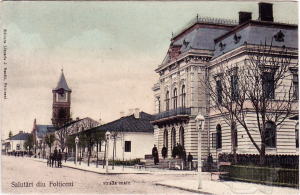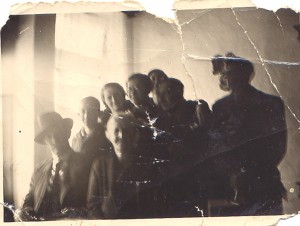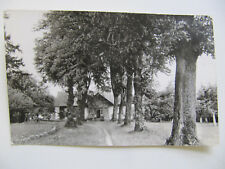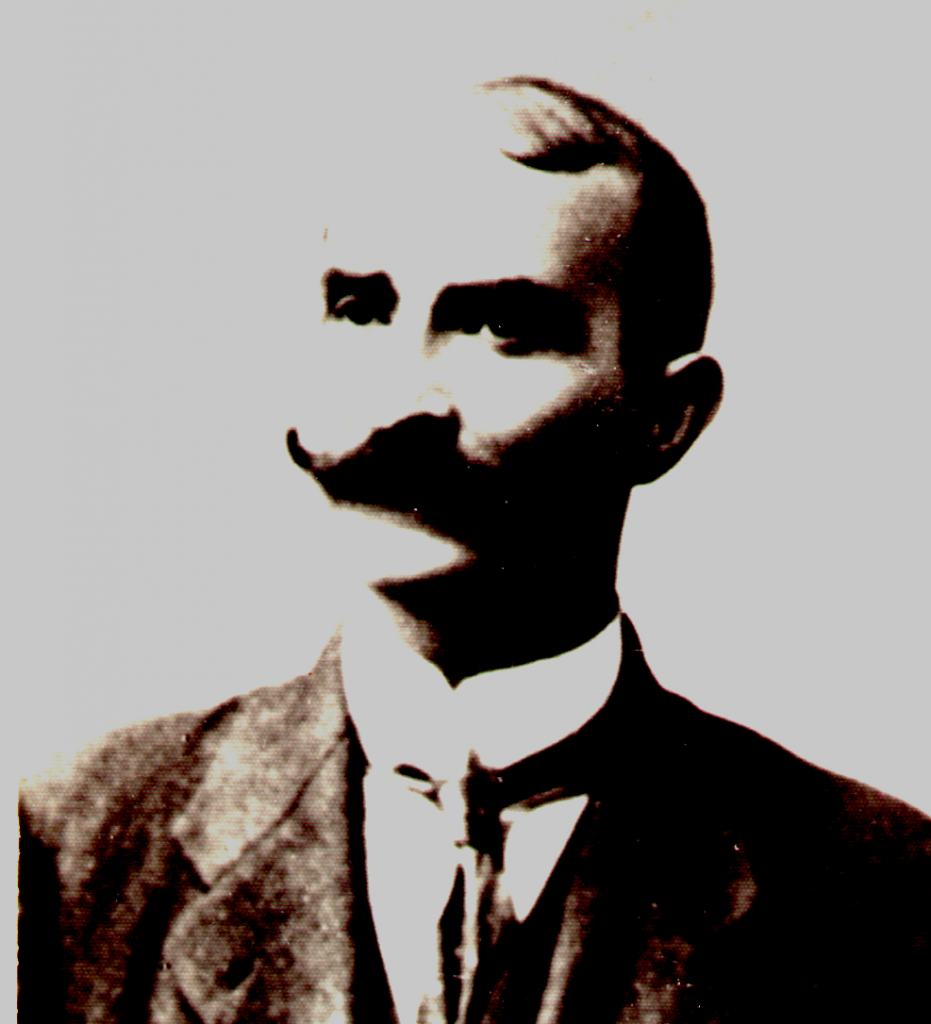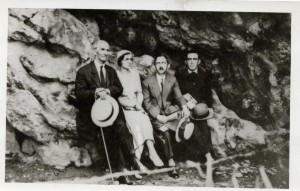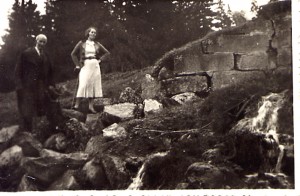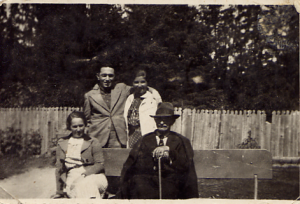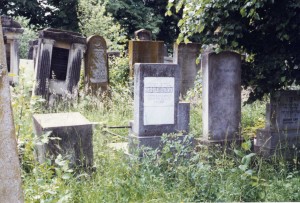Levi Memoir 1900 – 1937 Falticeni, Romania
We believe Moise was born in 1864 and Leonora in 1867.
Leonora’s story is very sad. As a young woman, she fell madly in love with a Romanian young man. As one might infer, her mom strongly opposed the liaison, threatening to kill herself if the marriage happens. Leonora obeyed. The heart broken man, went on to become a monk, in a nearby Monastery. Leonora, never married and became a bitter woman, with a sharp tongue feared by many.
Moise, grew up to become a professor at one of Falticeni, schools. We believe he taught Roumanian Literature. However, this was not his first choice for a profession. He really wanted to becomea doctor or a pharmacist, but it was not to be. When his uncle died, he had to provide for his mother and sister and such, chose the next good thing. In fact, our cousin Adina, (Avram’s daughter) tells us that this family lore, influenced her son’s Daniel decision to become a doctor.
Professor Levi was a tall, handsome man. He socialized with Falticeni intellectuals, and was highly respected and loved. In fact, during my visit to Falticeni, back in 1995, I met an old couple who knew Levi family; the wife happened to have been friends with one of his daughters, Tina. She fondly and reverently spoke of professor Levi.
Moise was very much in love with his first wife, Ida, a good friend of Leonora’s. They had four children together Sophia(Sima), Leontina(Tina), Mina and Avram. Avram’s delivery, in 1906, killed Ida. Her death, deeply affected Moise who, in fact never really recovered. With a new-born and three other young children, the widower urgently needed a new wife. Somehow he met Bassea (Betty) Wiseman, a young woman of 25.
Mr. Wiseman, Betty’s father, was a glass merchant, fallen on bad times. At the time of the story, he was bankrupt and in the process of sending his children, including Betty to his brother in England. We know that Bassea was very apprehensive of going to England, fearing she would not be able to keep kosher. Despite being a very beautiful blonde with blue eyes, at the age of 25, she considered herself a spinster. We believe she fell in love with the handsome widower and married him, via a religious ceremony. The rest of the Wiseman family, did leave for England and were very upset by Bassea’s refusal to accompany them.
The civil marriage only took place, much later when her daughter, Clara (Ruta), reached school age and could not use the Levi surname. It was a very confusing situation for Clara.
Moise and Bassea, had four children: Clara(Ruta) (1906), Miriam(Mita) (1910), Emilut (Milut) and Beno(1922). At the time, Beno arrived, Bassea was 42 and Moise was almost 60. In fact, during the entire pregnancy, Bassea hid in the house being ashamed of being pregnant at this “advanced age”. Bassea, brought up Avram as her son, and she truly loved him. The relationship with the older step daughters was very tense though. The girls, were demanding teenagers, often intimidating Bassea; lunch had to be ready for them, the moment they returned from school, otherwise a huge scandal would occur; Tina would say: “I am hungry and cold, where is the food”. Bassea felt terrorized. Moise had a weakness for Tina who took after Ida, her mother, more than the other children.
Avram, as opposed to his older sisters, loved Bassea and was a darling with all his siblings, including Bassea’s children. He was athletic and fearless, intimidating the bullies at school and protecting his younger siblings. Clara was only one year, younger than Avram and closest to him. She helped Avram with the academics and he taught to ride a bicycle, extremely daring for a girl in those times. Later, after leaving Falticeni, he sent or brought presents to Bassea who, in fact, was the only mother he ever knew.
Excerpt from Beno’s memories
My brother Milutz, my sister Miriam (Mitza), my parents, and I all lived together in the same house. Three other sisters, Rutza, Tina, Sofica, were living in Bucharest, along with my brother,
Abraham. Abraham was a student at an industrial school, which I too would attend a few years later after my parents passed away. I was the youngest in our family and spent my days cleaning and keeping house with my mother. I was about 10 at the time, and my main duty was to place my father’s glass of wine on the dinner table.
I loved my brothers very much, and it was a real holiday for me when they came home. I even remembered Abraham’s preferred dishes. My mom used to say to me: “Go to Nisan the butcher, tell
him Abraham is here, and that I want to prepare him something good to eat. Nisan never asked me what my mother wanted. He took a sheet of newspaper, put some meat on it, and explained: “This is for roast beef, and this is for stew. Your mother knows very well how to cook them”. He added an extra piece of meat, saying: “Take this also; I am coming tonight to see Avroom”.
My mother loved Abraham very much. She called him Avreimola. Abraham loved my mom as well. Every time he came home, he brought her a present. He was still a student. My mother showed me what she got: a small bottle of perfume, and a handkerchief. She told me: “I keep the perfume as a souvenir, and I will wear the handkerchief whenever I go to the synagogue, for Roshashana.
Unfortunately, I wasn’t able to spend as much time with Milutz. He had a job which required him to travel a lot. I didn’t know very much about his activities back then, and I still don’t know today.
End of excerpt
Longing for his first wife, Moise embraced Spiritualism a religious movement based on the belief that the spirits of the dead exist and have both the ability and the inclination to communicate with the living.The modernization of the Romanian society and its Europeanization make spiritism not only a fashionable phenomenon coming from the French salons where the ladies contact their dead husbands with the help of the mediums, but a real tool through which ideas about spirituality, culture and history spread in the Romanian space. Elites are the first to come into contact with the spiritualist phenomenon.
The elites of Falticeni, the Prosecutor, famous writer Mihail Sadoveanu, Chief of Police and professor Levi, met in the evenings to socialize and contact their departed, loved ones.
Though forever haunted by the memory of his first wife, Moise made a point of confiding to his youngest child, Beno, that contrary to appearances, he loved and respected Bassea. He staged this discussion by inviting Beno, to a walk through the park, and pointing to the fact that at time, Beno was the only boy left at home, in Falticeni.
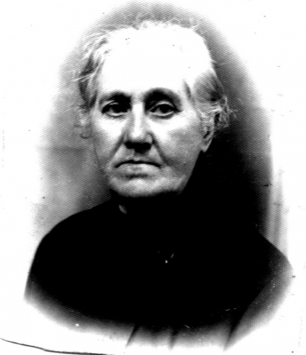
Bassea aka Betty
When Rutza was in her last year of Gymnasium she met Joseph Feller, her future husband. The story of how they met it is really fit for a movie. At the time of our story, Jospeh, (himself originally from Falticeni) was working as a clerk in Bucharest. He came to visit Falticeni over a vacation. By Falticeni standards, Joseph was an individual to be envied for his success in Bucharest. One day, his best friend, Ms Faierstein’s son, showed him the town’s photographer’s window that displayed the head shots of all the students completing the Gymnasium that year. His friend pointed to Rutza’s picture and said, “look she is the most beautiful girl in Falticeni”. Joseph really liked the girl! Determined to meet Rutza, he quickly pulled strings to find common acquaintances. He succeeded to find and visit them, in the same day- while Rutza was studying in their house. The two, instantly fell in love with each other and for the next year corresponded insatiably. Later Clara, traveled to Czernowitz to take her baccalaureate exams. She was academically smart and ambitious.
After almost a year of corresponding, Jospeh proposed, via a letter to professor Levi. Now Levi family was poor and Joseph’s family was poor as well. Joseph, the youngest of three children remained orphan at 14. His older sister Rebeca was married with Lazar Lazarovich a pub’s owner and Israel Feller his brother worked in Bucharest as a modest clerk. After the death of his parents, Joseph had to help in the pub as waiter and we know that he dreaded fetching the drinks from the dark, cold cellar. To escape this work, he ran away to Constantza, Black See, hoping to sneak into a ship traveling to America. The adventure finished with his brother fetching Joseph to Bucharest, and placing him in a shipping departments’ job, that leveraged his beautiful hand writing.
Going back to the marriage proposal, both sides of the family opposed the marriage and bitterly complained about the match. Moise was worried that Joseph did not have high level studies and a solid profession and Feller family felt that Joseph could marry into a richer, more aristocratic family. However, the young couple prevailed; they were engaged and Rutza went to Bucharest to University while Joseph went into the army.
In Bucharest, Rutza lived in the same house with Tina, and she renewed the ties with both Tina and Sophica. Moise was extremely happy, to have his girls from both his marriages, close and friendly.
Clara, married Joseph on July 7, 1932. and they moved together in a small apartment, in Bucharest. Joseph was an Opera fan and he often took Rutza with him. They could only afford the cheapest tickets, very high up at the gallery and a few candies wrapped in a paper bag. Rutza, the girl from Falticeni, perceived her husband as a rich and generous man.
Miriam, like Rutza, traveled to Czernowitz to take her baccalaureate exams. She too was lovely, academically smart and ambitious. In fact the story goes that Moses Rosen, the man that would become the chief rabbi of Romania, was in love with her and doggedly pursued her despite her reservation. The family remembers Mitza, running out of the house through the back door, whenever Moses, was coming to visit through the front door.
Later, Miriam moved to Bucharest as well and stayed with Rutza and Joseph. When she was afflicted by TB, Clara, without another thought packed them both up, left Joseph alone and took her sister, to a sanatorium at Tusnad, in Carpathian Mountains, where, after a while, recovered completely.
Back in Falticeni, one evening, the year Moise turned 70, he was visited by two of his former students that were then living in America. Moise was so very happy and honored by this visit. He laid out a festive dinner and spend many hours chatting with his guests. Overnight, Moise, quietly expired in his sleep, leaving behind and adolescent son, a desolated wife and seven grown up children.
After his passing, Joseph Feller, generously invited Bassea and Beno to his small apartment in Bucharest. Bassea moved immediately, why Beno stayed behind, in Falticeni, for a while to finish high school.


